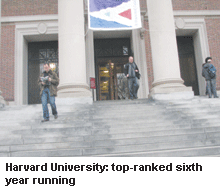America’s Harvard University remains top of the Times Higher Education-QS World University Rankings for the sixth year running. But the UK’s University of Cambridge is now second, pushing Yale University into third place. Fourth place is taken by University College London, up from seventh last year. Fifth place is shared by Imperial College London, up from sixth, and the University of Oxford, which has slipped from fourth spot last year.
 “Despite fierce competition, the UK continues to punch well above its weight. We are second only to the US, which spends twice as much as we do as a proportion of national income, and we are closing the gap,” says Steve Smith, president of Universities UK. But he adds: “It is clear that countries such as China will continue to invest heavily in their higher education systems, so we cannot presume that we will automatically maintain this leading position.”
“Despite fierce competition, the UK continues to punch well above its weight. We are second only to the US, which spends twice as much as we do as a proportion of national income, and we are closing the gap,” says Steve Smith, president of Universities UK. But he adds: “It is clear that countries such as China will continue to invest heavily in their higher education systems, so we cannot presume that we will automatically maintain this leading position.”
But the US’ overall dominance of world higher education appears to be slipping: it has 32 universities in the top 100 this year, down from 37 last year. Four US institutions have dropped out of the top 200, giving it a total of 54 that make the grade, down from 58 last year. The UK has 29 institutions in the top 200. Japan has 11 institutions in the top 200, up from ten last year, and its representation in the top 100 has increased from four to six.
Mainland China has maintained its position, with six institutions in the top 200. South Korea also increased its representation in the full list, with four institutions included in the ranking compared with three last year. Its best-placed institution, Seoul National University, rose from joint 50th to joint 47th. However only two of India’s 431 universities and 21,000 colleges — IIT-Bombay (163) and IIT-Delhi (181) — made it into the latest THE-QS top 200 league table.
Philanthropists wings clipped
They were hailed by politicians as pioneers who would turn around underperforming schools with their entrepreneurial spirit. But the days of tycoons being allowed to sponsor new academies on their own will end under controversial plans announced by the Labour government.
Any individual, charity or business that does not have first-hand educational experience will be barred from becoming the sole sponsor of an academy. Instead, they will be forced to have a co-sponsor or partner that can demonstrate a track record of improving schools.
Ed Balls, schools secretary, insists the development, part of an accreditation scheme for sponsors, will lead to the selection of “best possible” providers. But it marks a fundamental shift away from the original academies policy, which argued that outside organisations were needed to inject a fresh ethos into poorly performing schools.
Early backers from the world of business included courier magnate Sir Clive Bourne, sponsor of the highly successful Mossbourne Academy in Hackney, east London; Sir David Garrard, a retired property developer who backed Bexley Business Academy, Kent; and Lord Harris, former chairman of Carpetright, who sponsors a chain of nine academies in south London. Sponsors who now have school improvement experience will be allowed to back more academies in future.
But Michael Gove, shadow schools secretary, says: “This is an explicit attempt to reduce the number of sponsors in an effort to thwart the scheme. If this rule was in force when the programme started, children from deprived backgrounds from across the country would not have got the extra educational opportunities that their academies have provided them with.”
The decision to stop sole sponsorship by organisations without educational expertise is part of a general shift in recent years whereby the government has encouraged more schools and universities to back the academies programme. Increasing numbers of local authorities are also now acting as co-sponsors.
But Philip O’Hear, the first principal of Capital City Academy in Willesden, north-west London, which was sponsored by advertising millionaire Sir Frank Lowe, says the new rules could put off entrepreneurs from getting involved. “This would have blocked a lot of the original sponsors who recognised they had been successful and lucky in their own lives and felt duty bound to put something back,” says O’Hear.
A department for children, schools and families spokesman says sponsors from all backgrounds would continue to contribute to academies. “New sponsors without a direct education background will still have the opportunity to become lead sponsors, but we want educational partners or co-sponsors to continue to support them,” he says.
(Excerpted and adapted from Times Higher Education)